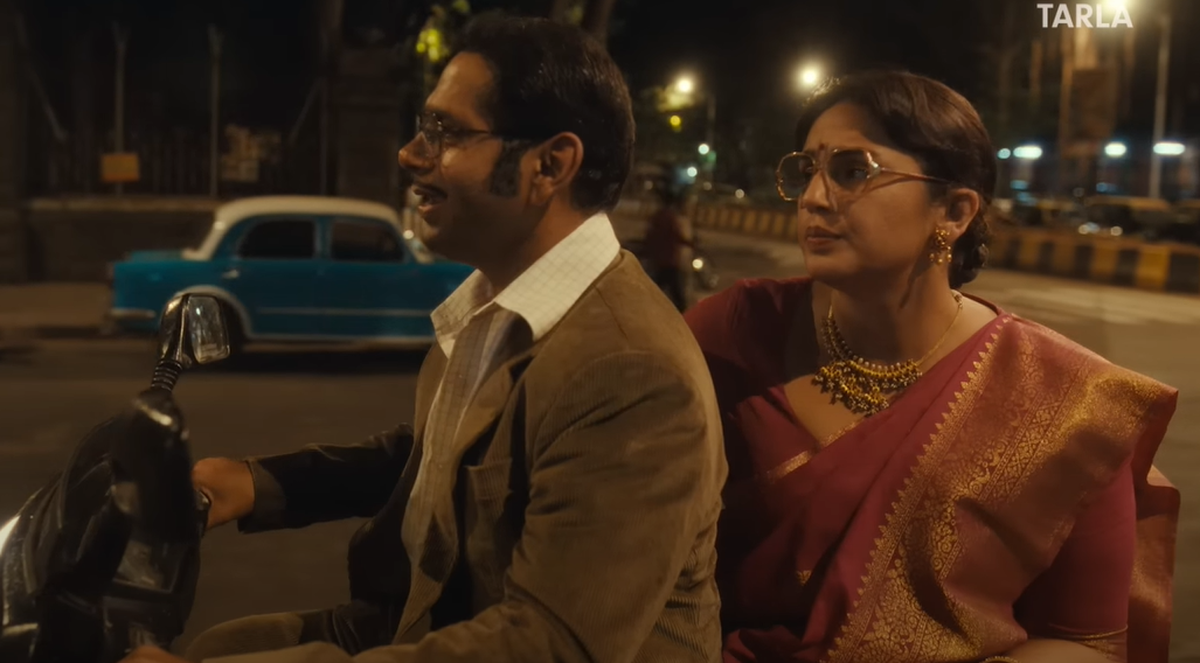RATING: ***
CAST: Huma Qureshi, Sharib Hashmi, Purnendu Bhattacharya, Veenah Naair.
DIRECTOR: Piyush Gupta
The film, directed by Piyush Gupta and featuring Huma Qureshi and Sharib Hashmi, offers a glimpse into the life of Tarla and her ascent to fame through her cookbook. This biopic serves as a fitting tribute to the late chef and cookbook author Tarla Dalal, especially for those who appreciate her culinary prowess. The film, Tarla, is a narrative about dreams, aspirations, family, highs, and lows, all tied together by a shared love for food. It stands out as one of the most compelling biopics in recent memory, although its execution outshines the performances.
The director, Piyush Gupta, tells a charming, uncomplicated story through a direct screenplay, bringing us closer to Tarla Dalal’s remarkable journey from a ‘housewife’ to a household name in ‘vegetarian’ recipes. The plot follows a young Tarla (Huma Qureshi) who dreams big but lacks a clear path. Despite being married for 12 years to Nalin Dalal (Sharib Hashmi) and having three children, she harbors a deep-seated dissatisfaction. Tarla yearns for more in life, often saying, ‘Kuch toh karna hai, par yeh kuch kya hai, abhi maloom nahi’.
As she continues to excel as a homemaker, opportunities begin to present themselves, forcing her to make difficult choices. This is where her dilemma begins, and how she overcomes these challenges forms the crux of the story. We witness Tarla’s journey from her husband encouraging her to start home-cooking classes, to her struggle to sell her first cookbook, and finally, to hosting her own cooking show on TV.
The film, Tarla, with a runtime of nearly two hours, is neither drawn-out nor dull, but it does struggle at times to maintain engagement. Gupta, who co-wrote the story with Gautam Ved, doesn’t shy away from portraying the challenges a homemaker faces when trying to balance her career and family responsibilities. The scenes where Huma celebrates her small victories and finds joy in her work are particularly enjoyable. However, one question remains unanswered: Did Tarla have a natural passion for cooking, or did she discover it while trying to persuade her non-vegetarian husband with equally tasty vegetarian dishes?
If Gupta had explored this aspect more, we could have gained a deeper understanding of her life decisions. The film also barely touches on Tarla’s childhood or youth. Why was she content to cook in the kitchen, unlike other girls her age? Why was she willing to abandon her studies and marry at her parents’ insistence, without pursuing a career?
Huma Qureshi fully commits to her role as the titular character, but it’s hard to envision her as Tarla. We remember the late chef as a person with a contagious smile and a serene demeanor, someone who you can’t imagine losing her temper or raising her voice. In contrast, Huma’s portrayal of Tarla feels disconnected from the original character in several instances.
This disconnect is not just physical, but also in the way, Huma expresses emotions onscreen — she successfully conveys the message but doesn’t convincingly transport us back to Tarla Dalal’s era. I can’t help but wonder if a different casting choice for the main role would have had a stronger impact on the performance.
Sharib Hashmi, as Nalin, who has a habit of rating everything — from Tarla’s smile to her cooking skills to his workday — is flawless in his acting. His portrayal of a supportive husband who steps into the role of a publisher after losing his job at a textile factory is effortless. The emotionally intense scenes between Huma and Sharib are beautifully captured. Bharati Achrekar, as Tarla’s neighborhood aunt, provides valuable support to the story and serves as a constant source of motivation.






